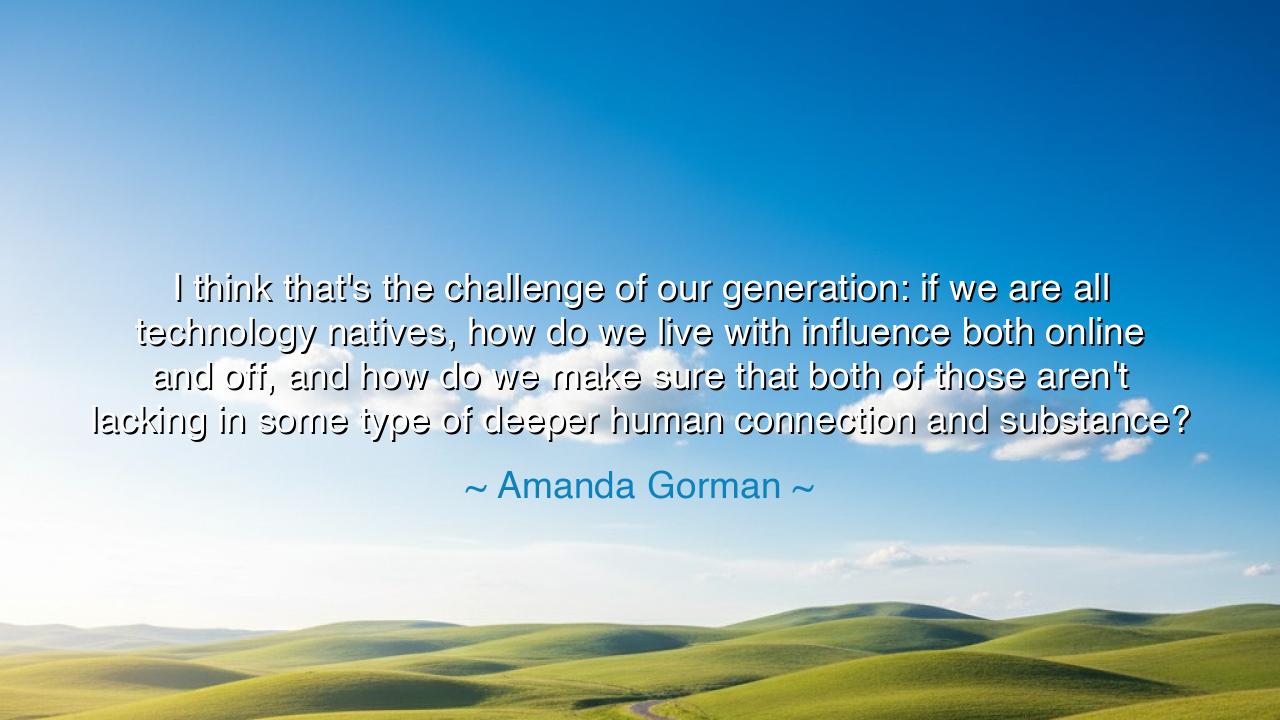
I think that's the challenge of our generation: if we are all
I think that's the challenge of our generation: if we are all technology natives, how do we live with influence both online and off, and how do we make sure that both of those aren't lacking in some type of deeper human connection and substance?






The words of Amanda Gorman—“I think that's the challenge of our generation: if we are all technology natives, how do we live with influence both online and off, and how do we make sure that both of those aren't lacking in some type of deeper human connection and substance?”—resound like a question carved into stone for the youth of this age. She speaks not as one condemning technology, but as one who sees its double-edged power. For we, unlike our ancestors, are born into a world where the digital and the physical are inseparable, where every soul lives in two realms at once. The challenge is not simply to master technology, but to preserve the human connection that gives life meaning.
The origin of this challenge lies in the sudden acceleration of human invention. For countless ages, the rhythm of life was slow, tethered to the rise and fall of the sun, the growth of crops, the cycles of seasons. But in the span of a single century, humankind leapt from the plow to the smartphone, from the written letter to instantaneous communication across oceans. We became technology natives, citizens of a vast digital empire. Yet while our tools have evolved at lightning speed, our hearts still crave what they always have—touch, presence, substance, the warmth of another soul. Thus, the dilemma arises: how to be fully alive in both worlds, and not hollow in either?
Consider the story of the Arab Spring in 2011, when online voices united to topple regimes and demand justice. Technology amplified the cries of the oppressed, connecting strangers into a movement that shook governments. But though the digital realm carried the flame, the substance of change was in the streets, in the courage of bodies standing shoulder to shoulder, facing tanks and rifles with bare hands. The lesson here is clear: influence online may spark revolution, but only human presence gives it substance. The two realms are not enemies—they are partners, and when joined, they can reshape the world.
Yet Gorman warns of the shadow: a life lived only online risks becoming shallow, a theater of images without depth. Influence measured in likes and followers can never equal the weight of a true friend’s hand in times of grief, nor the joy of a shared meal, nor the dignity of listening without distraction. To neglect the offline world is to abandon the soil in which human compassion grows. But to reject the online realm entirely is to forfeit the power of connection across nations, the ability to share ideas with millions, the chance to extend empathy beyond borders. The challenge of our generation is balance, and balance requires wisdom.
Deeper connection and substance—these are the treasures that must guide us. Without them, both the digital and physical life are empty. A tweet may stir emotion, but without substance it fades; a meeting in person may carry presence, but without deeper connection it becomes routine. The true task of our age is to ensure that whether we speak through a glowing screen or through face-to-face presence, we speak with honesty, compassion, and meaning.
The lesson, then, is this: do not allow technology to hollow you out. Use it to build, not to replace. Let the digital world extend your voice, but not consume your soul. Choose presence when it is possible; offer sincerity when it is needed; and seek depth even in the brevity of online words. Remember always that technology is the vessel, but humanity is the substance.
In practice, this means cultivating discipline. Set aside times to be free of the screen, to sit with family, to walk with friends, to feel the earth beneath your feet. When you speak online, write not only to be seen, but to be understood, to give encouragement, to inspire truth. Use your influence not to build shadows, but to strengthen connections that endure beyond the digital glow. Live fully in both worlds, but let neither rob you of your humanity.
Thus, let Amanda Gorman’s words echo through the halls of time: ours is the challenge of weaving two worlds into one life. If we succeed, we will be the first generation to live both online and off with integrity, with balance, with substance. If we fail, we risk losing the essence of human connection to the very tools that promised to unite us. The choice lies before us, and the call is clear: embrace technology, but never at the cost of your humanity. For the heart is the true medium, and without it, all influence fades.






AAdministratorAdministrator
Welcome, honored guests. Please leave a comment, we will respond soon